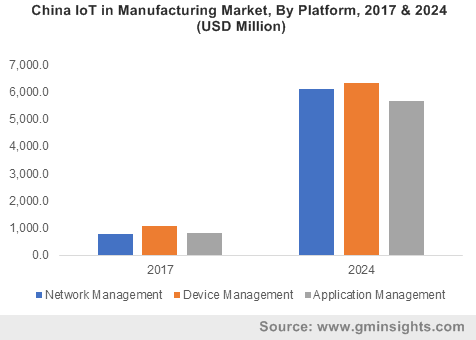A generic outline of IoT in manufacturing market: global industry to surpass a valuation benchmark of USD 150 billion by 2024
Publisher : Fractovia | Published Date : 2017-10-11Request Sample
The deployment of IoT in manufacturing market has brought forth a revolutionary transformation in industrial operations lately, pertaining to the significant benefits delivered by the Internet of Things. Manufacturing companies have been joining forces with connected technology giants to automate assembly operations, reduce downtime, and unabashedly harness the power of IoT in manufacturing industry. A recent precedent underlining the aforementioned fact is Hitachi’s collaboration with Toyota. The two Japanese conglomerates plan to tie up with an intent to exploit Hitachi’s IoT platform for enhancing the productivity at their manufacturing sites. Hitachi’s IoT platform utilizes big data analytics and AI technology to accelerate the PDCA cycle at manufacturing sites, which is expected to have a profound impact on the regional IoT in manufacturing market share. Backed by a stream of advantages such as data analysis, proactive maintenance, automation, safety, lesser downtime, and remote management, IoT in manufacturing market size was pegged at USD 20 billion in 2016.
India IoT in manufacturing market, by application, 2016 & 2024 (USD Million)

The impact of IoT in manufacturing industry, cite experts, would lead to a paradigm shift in business models, increasing the deployment of automation and subsequently increasing the output with gusto. Having recognized the immense potential of this tech prodigy, companies have been vying with one another to unlock the potential of this technology in as many use cases as possible. On these grounds, IoT in manufacturing market has lately been witnessing a plethora of corporate partnerships and JVs, that would enable both the parties to jointly work on improvising manufacturing operations via IoT platforms. For instance, VMware and SAP have scarcely announced the commencement of a new partnership with an aim to exploit the Internet of Things across myriad applications, with dramatized priority on the manufacturing sector.
The companies have categorically stated their goals to accelerate IoT initiatives and ensure accurate scalability and quick execution of on-site IoT projects, which would certainly have a commendable impact on IoT in manufacturing industry. Furthermore, both the conglomerates have already penned down their success story as far as the deployment of IoT is concerned. VMWare has been on a roll, collaborating alongside Dell for delivering IoT monitoring services for the Dell Edge Gateway, while simultaneously developing platforms for virtual desktops at major universities across the United States. SAP's cloud platform has been deployed for managing a logistics platform dubbed ‘smartPORT’ for shipping operations in Hamburg, in addition to analyzing parking sensor data in Vienna. The aforementioned instances bear testimony to the fact that the VMWare-SAP alliance may have a rather profound influence on IoT in manufacturing market share, since both the companies have demonstrated their predominance in harnessing the power of the Internet of Things for a widespread array of end-use domains.
How the deployment of IoT in manufacturing industry may disrupt two prominent disciplines:
The impact of IoT in manufacturing market on the logistics domain
According to experts, the utilization of IoT in manufacturing industry would lead to a renewed realm of connectivity, where every operation is interconnected with the other. The paradigm shift in operational interlinking would have logistics at the crossroads, which would technically make the domain rather complicated. Despite the fact that IoT in manufacturing market would potentially reduce inventories, manufacturers would require to liaison with more and more parties across the globe, since IoT would interconnect multiple factories in multiple regions. In order to combat the prospective challenges that logistics may face in the ensuing years, IoT must be deployed to generate a global, user-friendly architecture with the help of predicative algorithms, that would enable logistics players to harness the power of IoT in manufacturing industry, without getting embroiled in the maze of zillion interconnections.
Deploying IoT in manufacturing market may transform the traditional supply chain model
Having recognized the aftermath of IoT in manufacturing industry, experts have reason to believe that the Internet of Things would remarkably influence the future supply chain models. The aim would be to seamlessly integrate information into the supply chain, which would result in copious amounts of data storage. In order that huge supply chain operators are able to keep pace with the changing trends of IoT, two very basic competencies must be incorporated in the system that may modify the value chain, namely, reproducibility and stability. Companies partaking in IoT in manufacturing market share would need to perpetually focus on automating the value chain across numerous production lines, but with the deployment of highly analytical algorithms, to ensure definite precision and accuracy.
While a plethora of business spheres have borne the dynamic impact of IoT, none of them seem to have experienced a transformation as vivid as the manufacturing domain. The deployment of IoT in manufacturing market has led to a remarkable change in the current production landscape of major industries, given that the technology enables powerful connectivity amidst all the devices and systems to build connected applications that optimize operational processes. Pertaining to the rapidly increasing demand for operational big data transformation into actionable insights for quicker, strategic decision-making, companies have been liberally mobilizing IoT in manufacturing industry. Furthermore, the requirement for performance enhancement, productivity improvement, and quality and uptime upgradation has necessitated the demand for predictive maintenance in production, which would lead to a remarkable upswing in IoT in manufacturing market trends in the forthcoming years.